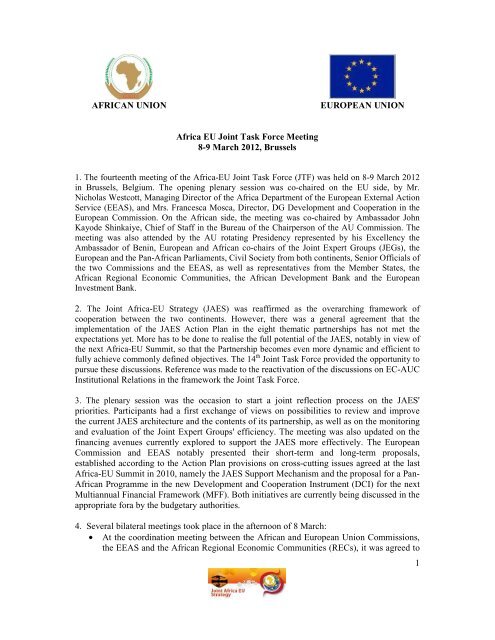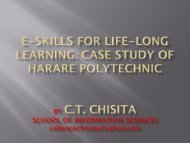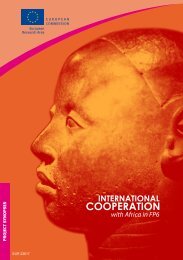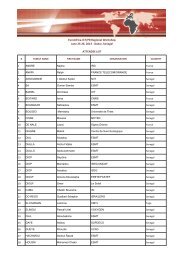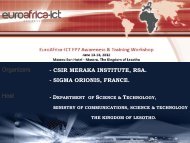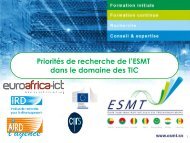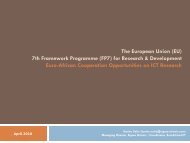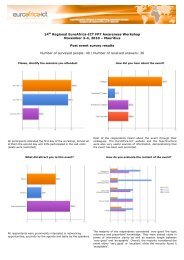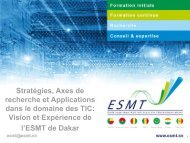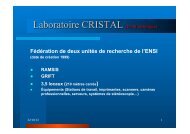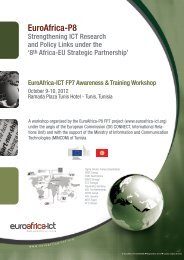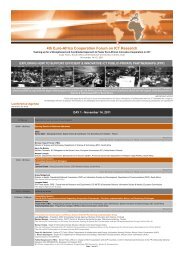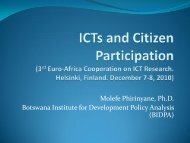Brussels, 8-9 March 2012 - Africa-EU Partnership
Brussels, 8-9 March 2012 - Africa-EU Partnership
Brussels, 8-9 March 2012 - Africa-EU Partnership
Create successful ePaper yourself
Turn your PDF publications into a flip-book with our unique Google optimized e-Paper software.
AFRICAN UNION<strong>EU</strong>ROPEAN UNION<strong>Africa</strong> <strong>EU</strong> Joint Task Force Meeting8-9 <strong>March</strong> <strong>2012</strong>, <strong>Brussels</strong>1. The fourteenth meeting of the <strong>Africa</strong>-<strong>EU</strong> Joint Task Force (JTF) was held on 8-9 <strong>March</strong> <strong>2012</strong>in <strong>Brussels</strong>, Belgium. The opening plenary session was co-chaired on the <strong>EU</strong> side, by Mr.Nicholas Westcott, Managing Director of the <strong>Africa</strong> Department of the European External ActionService (EEAS), and Mrs. Francesca Mosca, Director, DG Development and Cooperation in theEuropean Commission. On the <strong>Africa</strong>n side, the meeting was co-chaired by Ambassador JohnKayode Shinkaiye, Chief of Staff in the Bureau of the Chairperson of the AU Commission. Themeeting was also attended by the AU rotating Presidency represented by his Excellency theAmbassador of Benin, European and <strong>Africa</strong>n co-chairs of the Joint Expert Groups (JEGs), theEuropean and the Pan-<strong>Africa</strong>n Parliaments, Civil Society from both continents, Senior Officials ofthe two Commissions and the EEAS, as well as representatives from the Member States, the<strong>Africa</strong>n Regional Economic Communities, the <strong>Africa</strong>n Development Bank and the EuropeanInvestment Bank.2. The Joint <strong>Africa</strong>-<strong>EU</strong> Strategy (JAES) was reaffirmed as the overarching framework ofcooperation between the two continents. However, there was a general agreement that theimplementation of the JAES Action Plan in the eight thematic partnerships has not met theexpectations yet. More has to be done to realise the full potential of the JAES, notably in view ofthe next <strong>Africa</strong>-<strong>EU</strong> Summit, so that the <strong>Partnership</strong> becomes even more dynamic and efficient tofully achieve commonly defined objectives. The 14 th Joint Task Force provided the opportunity topursue these discussions. Reference was made to the reactivation of the discussions on EC-AUCInstitutional Relations in the framework the Joint Task Force.3. The plenary session was the occasion to start a joint reflection process on the JAES'priorities. Participants had a first exchange of views on possibilities to review and improvethe current JAES architecture and the contents of its partnership, as well as on the monitoringand evaluation of the Joint Expert Groups' efficiency. The meeting was also updated on thefinancing avenues currently explored to support the JAES more effectively. The EuropeanCommission and EEAS notably presented their short-term and long-term proposals,established according to the Action Plan provisions on cross-cutting issues agreed at the last<strong>Africa</strong>-<strong>EU</strong> Summit in 2010, namely the JAES Support Mechanism and the proposal for a Pan-<strong>Africa</strong>n Programme in the new Development and Cooperation Instrument (DCI) for the nextMultiannual Financial Framework (MFF). Both initiatives are currently being discussed in theappropriate fora by the budgetary authorities.4. Several bilateral meetings took place in the afternoon of 8 <strong>March</strong>:• At the coordination meeting between the <strong>Africa</strong>n and European Union Commissions,the EEAS and the <strong>Africa</strong>n Regional Economic Communities (RECs), it was agreed to1
foster the involvement of the RECs in the JAES and deepen interactions between theregional and continental levels.• The meeting between the <strong>Africa</strong>n and European Union Commissions, the EEAS, the<strong>Africa</strong>n Development Bank and the European Investment Bank provided theopportunity to strengthen their cooperation in implementing the current JAES ActionPlan, and to discuss the future cooperation notably in the context of the proposed pan-<strong>Africa</strong>n Programme.• The discussion between the European External Action Service and the <strong>Africa</strong>n UnionCommission addressed the legal issues, in particular the principle of universaljurisdiction, the International Criminal Court, and the Hissène Habré case.5. On 9 <strong>March</strong>, participants reported back on the state of play of the implementation of thethematic partnerships (see reports below). The co-Chairs of the meeting welcomed theprogress made and called on the Joint Expert Groups to focus on prioritisation of activitiesand the delivery of concrete outcomes.6. The co-chairs commended the participants for their contribution to the JTF and once againstated that the JAES remains a unique framework for the continent-to-continent relations. Thejoint reflection process on the JAES implementing architecture should continue in order toprepare the next Summit in a timely manner and ensure that its outcomes will contribute tothe deepening of the <strong>Partnership</strong>.7. The next <strong>Africa</strong>-<strong>EU</strong> Joint Task Force will take place in Addis Ababa in last quarter of<strong>2012</strong>.2
AUC-EC Institutional Relations1. Information and communicationI. Participants<strong>Africa</strong>: Habiba Meijri Cheikh<strong>EU</strong>: Christophe Boulierac, (<strong>EU</strong> del. to the AU), Marie Panou, (DG HR, EuropeanCommission); Charles Brasseur (EEAS); Cristian Simon (DEVCO, European Commission) ;Nancy Dzokoto Pomenya (DG DEVCO, European Commission); J. Nadal Sastre (<strong>EU</strong>delegation to the AU).II. OutcomesProgress achieved in the partnership since last Joint Task Force (Oct 2011)Implementation of the <strong>Africa</strong>-<strong>EU</strong> Communication PlanAfter the adoption of the draft Joint <strong>Africa</strong>-<strong>EU</strong> Communication plan <strong>2012</strong> at the last <strong>Africa</strong>-<strong>EU</strong> Joint Task Force in October 2011, AU and <strong>EU</strong> services are now working jointly to movetowards the implementation of concrete actions and outcomes. To this purpose, 300 000Euros have been committed.The <strong>Africa</strong>n Union committed to comment on the draft communication plan within one weekto allow the launch of the procurement process as soon as possible.Participants discussed the future of the programme media and development and agreed toreconvene for a follow up.Priorities for <strong>2012</strong> and way aheadConcrete activities and projectsThe Joint <strong>Africa</strong>-<strong>EU</strong> Communication plan is divided into 4 main categories:• Online services and activities.• Media relations.• Events.• Visibility materials.Actors and timelinesThe draft communication plan for <strong>2012</strong> adopted at the last Joint Task Force indicates theactors and timeline for each activity thereby specifying the role of <strong>Africa</strong>n Union andEuropean Union services.One key activity that will be implemented in <strong>2012</strong> is the continuation of the Joint <strong>Africa</strong>-<strong>EU</strong>Strategy website. On this particular item, participants agreed that:3
• The JAES website structure should be simplified: This implies merging the sectionsfocus and news in the short term. Ahead of the 4th <strong>Africa</strong>-<strong>EU</strong> Summit the consultantwill find a way to allow for the publication of some Focus articles for important news.• In terms of content, it was decided that the priority will be the regular updating of thenews section of the website and the improvement of the access to referencedocuments.• It was agreed that the first target group is in priority the stakeholders of the JAES, i.e.the journalists, the academic world (students, researchers, think tanks).• The <strong>Africa</strong>n Union reaffirmed its strong political interest in the JAES website andcommited to appoint one person responsible for updating the JAES website. For the<strong>Africa</strong>n Union, the <strong>Africa</strong>-<strong>EU</strong> partnership is the most important among itspartnerships. The JAES website remains a tangible outcome of how <strong>Africa</strong> and Europecommunicate jointly on issues of common interests. The AU also informedparticipants of a budget available specifically for the JAES website.The adequate allocation of human resources for the JAES website has been re-defined.Internal communication was also discussed.2. Conference organisationI. Participants<strong>Africa</strong>: Mr Ambang Agbor (Deputy Secretary General), Ms Fatoumata Keita (DCMP), MsPamela Youth (DCMP)<strong>EU</strong>: Mr Brian Fox (DG SCIC), Mr Luigi Fiorino (DG SCIC)II. OutcomesPriorities for <strong>2012</strong> and way aheadThe two parties identified areas for future activities, some of which had already been agreedin April 2011 but could not be carried out as scheduled last year.DG Interpretation will check the feasibility and the possible dates for the following activities:enhancement of skills of AU interpreters in their B languages; organisation of training courseson note-taking in consecutive interpretation; presence of AU interpreters as observers ataccreditation tests for freelance interpreters.DG Interpretation will also explore again the possibility to provide the DCMP with the Lithosdatabase and with information on how to set up a system similar to Medata.It will also see what can be done to help the Office of the Secretary General of the AUCommission on: i) training in report writing; ii) conference organisation; iii) familiarisationwith the structure and working methods of the EC. For these activities, if necessary the AUwill be redirected to the relevant EC services outside DG Interpretation.4
Concrete initiatives and projects: Nothing concrete for the time being, as the feasibility of allactivities will have to be checked first.Actors and timeline: Different colleagues in DG SCIC and the DCMP, as needed, will liaisein the next few months.3. Linguistic CooperationI. Participants<strong>Africa</strong>: Ms Pamela Youth (Conference Services) and Mr Agbor Ambang (Bureau of theChairperson)<strong>EU</strong>: Ms Roxana Manuela Enciu and Mr Cristian Buchiu (Directorate General for Translation)II. OutcomesPresentation on European Master in Translation (EMT) and on cooperation with<strong>Africa</strong>n Master in Conference Interpretation and Translation (AMCIT)- Introduction of the EMT programme and the current cooperation with AMCIT anddistribution of information materials- Previous cooperation: facilitating academic exchanges between EMT experts and AMCITcoordinators (invitation to the EMT Conference)- Underlining the need for professional translators as a shared point between the EC and theAUC - a discussion on similarities and differences of needs and organisational practices- Taking note of the inclusion of AMCIT in the Pan-<strong>Africa</strong>n University, a positivedevelopment in the context of the encouragement of the <strong>Africa</strong>n ownership of the project- Future cooperation: organising training(s) for trainers - academic content may be providedby EMT experts (provided that financial resources can be identified within the Joint<strong>Partnership</strong> or other funding sources).Linguistic cooperationDG Translation mentioned its interest in establishing cooperation on Arabic. DG Translationis looking into developing a small capacity in Arabic and it could benefit from the experienceof AUC in this field.Colleagues in AUC Conference Services showed their interest in such cooperation.Training issuesMr Agbor Ambang stated the deep interest of AUC in training in report writing. This trainingis very important in the light of AUC needs.This type of training is not part of the remit of DG Translation.5
<strong>Africa</strong>-<strong>EU</strong> Thematic <strong>Partnership</strong>s<strong>Partnership</strong> 1 - Peace and SecurityI. Participants<strong>Africa</strong>:H. E. Belaid Abdel -Naceur, Ambassador of Algeria (Co-Chair),Amb. Ajay Bramdeo, Permanent Representative of AU to the <strong>EU</strong> and ACPAmb. John Aggrey, Diplomatic Advisor, AUCAmb. Zounguere Sokambi, ECCASLorenci Kiopper, South <strong>Africa</strong> Embassy, <strong>Brussels</strong>Farahat Mohammed, Ministry of Foreign Affairs and Cooperation of MoroccoNasri Terkia, Embassy of Algeria, <strong>Brussels</strong>Dr. Admore Mupoki Kambudzi, Secretary PSC, AUCElizabeth Choge, Peace and Security Department, AUCAbdallah Naser, AU Mission in <strong>Brussels</strong><strong>EU</strong>:Jose Costa Pereira, EEAS-MD <strong>Africa</strong> (Co-Chair),Sandra Paesen (EEAS)Jens Moller (DEVCO)Bernard Friedling (DEVCO)Stephan Saalow, Permanent Representative of Germany to the AUElina Rimppi, Permanent Representation of Finland to the <strong>EU</strong>Thomas Peyker, <strong>EU</strong> delegation of the AU-Addis Ababa,Bogdan Batic, <strong>EU</strong> Delegation to the AUAnnelies Verstichel, Belgian Delegation to the <strong>EU</strong> PSC (PMG)Marjolein Jongman, MFA Belgium, Security Policy Department, CSDPHeli Siivola, Ministry of Foreign Affairs, FinlandVanessa Redmond, UK Permanent Representation to the <strong>EU</strong>Riccardo Villa, Italian Permanent Representation (COAFR/PMG)Eva Martinez, Spanish Permanent Representation (COAFR)Inga Sezenyte, Ministry of Foreign Affairs, LithuaniaChristina Avani, CY Permanent Rep, COAFR + ACPCamille Grousselas, MAEE-FranceLaurence Pais, MAEE – FranceMark Thomas, UK Permanent Representative, OPS/CSDPMaria Leticia Bairrada, Ministry of Defence, PortugalAlbrecht Braun, COM, APFFlavio Bello, DG ECHO, European CommissionJeremy Lester, Head of Division, EEAS, II.A.IBirgit Loeser (CPCC)Tim Clarcke (CMPD)6
II. OutcomesProgress achieved in the partnership since last JTF (Oct 2011)Political dialogue:The meeting envisaged between <strong>EU</strong> Military Committee and the AU Military StaffCommittee has not yet taken place.Discussion on the <strong>Africa</strong>n-led Peace-Support Operations (PSOs)- Both sides are still exploring means of keeping providing predictable, flexible andsustainable funding for PSOs undertaken by the AU. The AU and the <strong>EU</strong> have e.g. engagedwith non-traditional donors (China, Turkey and League of Arab States countries) to seekadditional financing for AMISOM. References were made to the implementation of the ProdiPanel recommendations.- Regarding Sudan, the work of the AU High Level Implementation Panel and thus of the AUwas considered essential, the <strong>EU</strong> will continue its support to it. The confidence building focusbetween the two parties is of major importance (e.g. signing of the non-aggression pact). Thedialogue between both countries needs to be kept open. The <strong>EU</strong> informed that it is to engagein a small-scale European Security and Defence Policy mission to improve the security of theJuba airport.- Regarding Somalia, the <strong>EU</strong> informed about the London Conference of 23 February <strong>2012</strong>.Concretely, the Conference agreed on Joint Financial Management and on a Stability Fundthat should increase the level of financial management in the country and help in governingparts of the country beyond Mogadishu. The AU reiterated the importance of the UN SecurityCouncil Resolution 2036 on Somalia, and stressed that the country has reached a crucial stagethat requires further support of the international community, in particular the <strong>EU</strong>. The <strong>EU</strong>envisages a civilian Common Security and Defence Policy mission to build a maritimesecurity capacity in the region.- The <strong>EU</strong> financial support for the Regional Initiative to fight the LRA was considered ascrucial.- The AU highlighted progress on the operationalization of the <strong>Africa</strong>n Peace and SecurityArchitecture (APSA):1. APSA support programme was launched in 2011 and is going through its normaldevelopment, financed through a Contribution Agreement.2. The AU-RECs-RMs APSA Roadmap (2011-2013) was finalised in 2011 and is underimplementation, with an Action Plan serving as a framework for support by partners.3. The <strong>EU</strong> to support 16 <strong>Africa</strong>n Training Centers (<strong>2012</strong>-2014).4. ASF Roadmap III finalised and adopted by the AU.5. The second AMANI <strong>Africa</strong> Cycle is in its initial planning phase.6. On the AU Continental Early Warning System; the AU is consulting with RECs to speedup connectivity with the Regional EWS.7
Priorities for <strong>2012</strong> and way ahead• Political dialogue: to convene the 5 th meeting of the PSC-to-PSC meeting in spring<strong>2012</strong>, maintaining cooperation on concrete crisis areas. Regular VTCs between the <strong>EU</strong>PSC and the AU PSC are essential.• Continued operationalization of APSA: Joint efforts as regards the Initial PlanningConference for the second AMANI <strong>Africa</strong> Cycle, start implementation of the ASFroadmap III, establish AU Liaison Offices to RECs/RMs, implement the <strong>Africa</strong>nTraining Centers Programme. The AU will intensify efforts to mobilise resources forthe <strong>Africa</strong>n Peace Fund.• Funding of <strong>Africa</strong>n PSOs: <strong>EU</strong> and AU to deploy further efforts to mobilise financingfor AMISOM, including from other donors.• Cross-cutting issues: The AU to finalise the establishment of the <strong>Africa</strong>n Commissionon Nuclear Energy (AFCONE) Secretariat by putting in place the necessary personneland work plan. Concluding a legal basis for cooperation between AFCONE and<strong>EU</strong>RATOM is being explored.8
<strong>Partnership</strong> 2 - Democratic Governance and Human RightsCoordination meetingI. Participants<strong>Africa</strong>: Salah Hammad (AUC-DPA); Habiba Merji-Cheikh (AUC-CID) Omar Shalaby(Egypt-MFA), Shari Cupido (Embassy South <strong>Africa</strong>), Philisiwe Chidawnyika (EmbassyZimbabwe); (Hon. Laroussi Hammi, Vice President PAP).<strong>EU</strong>: Renée Iltis (EEAS), Joana Cruz (EEAS), Gary Quince (EEAS); Petra Hagelstam(DEVCO); Agata Nieboj (DEVCO) Ama Annan (<strong>EU</strong> DEL to AU); Olivier Sperling(Germany-MFA); Franziska Hagedorn (Germany-MFA); Carolina Quina (Portugal-MFA);Alexandra Bilreiro (Portugal-MFA).II. OutcomesThe coordination meeting was co-chaired by Egypt, Chair of the <strong>Africa</strong>n ImplementationTeam, and Germany and Portugal, Co-Chairs of the <strong>EU</strong> Implementation Team. The meetingdiscussed the preparation for the next meetings in Geneva. It was agreed that the first week ofJune would be a good time to hold the Workshop on Racism and the next iJEG.On the first item, concerning the Workshop on Racism, it was agreed to work through therespective AU and <strong>EU</strong> delegations in Geneva, for both logistical issues (interpretation andvenue) and to lead the groundwork on substance. In addition, it was agreed to ask that the twodelegations would work on a joint concept paper to serve as a basis for the discussions, whichshould be made available five weeks prior to the holding of the Workshop (i.e. last weekApril). As for potential guests, a few ideas were brought up to the table (e.g. the Head of theAnti-Discrimination Unit of the Office of the High Commissioner for Human Rights(OHCHR) and the Special Rapporteurs of the Human Rights Council on Racism and Freedomof Expression). The AU Commission agreed to contact the <strong>Africa</strong>n Commission on Humanand Peoples’ Rights to inform about the workshop and potential participation whereas the <strong>EU</strong>side agreed to contact the OHCHR to facilitate the logistical aspects.Regarding the iJEG, the meeting reached a preliminary agreement on the next agenda givingappropriate attention to the three priorities. The June meeting should discuss therecommendations of the two Working Groups on Natural Resources and Freedom ofExpression, and how to take these recommendations forward. A briefing by the two co-chairs(Egypt and Germany) on the outcome of the Freedom of Expression workshop will bepresented. One practical suggestion that was made by the AU Commission was to link onespecific recommendation of the report (i.e. support to Pan-<strong>Africa</strong>n Media Network –“PAMNET”) to the upcoming celebration by UNESCO of the World Press Freedom Day onMay 3 rd in Tunis. The suggestion was supported by the <strong>EU</strong> side. It was agreed that the workof the two Working Groups formed under the Platform for Dialogue should be continued.Under the umbrella of the support to the <strong>Africa</strong>n Governance Architecture, the meetingagreed that it would be useful to have a presentation on the popularisation of the <strong>Africa</strong>n9
Charter on Democracy, Elections and Governance at the next iJEG. In this regard, othersuggestions were put forward to invite guests on particular topics to enrich future iJEGdiscussions (e.g. AU Commission Head of Election Unit). In the area of elections, it wasnoted that there is an interest in further training programmes for media personnel, in particularfor the AU Commission Department for Information and Communication staff.In line with the JTF plenary discussion held in morning of the 8 th <strong>March</strong> on the need toimprove the functioning of the iJEGs, in particular for leaving enough time for each priority,it was also agreed to address this issue at the next meeting.10
<strong>Partnership</strong> 3 - Trade, Regional Integration and InfrastructuresI. ParticipantsName Country/organisation email addressJakub WUDARSKI Permanent Representation of Poland jakub.wudarski@msz.gov.plJamel BOUIDARIA Union du Maghreb Arabe boujamel@yahoo.comMoritz ACKERMANN Germany, Ministry for Economic Moritz.ackermann@bmz.bund.deCooperation and DevelopmentBharti DAYA <strong>Africa</strong> co-chair, DTI South <strong>Africa</strong> bdaya@thedti.gov.zaGiorgio COCCHI <strong>EU</strong> co-chair, EC DG DEVCO giorgio.cocchi@ec.europa.euJoachim ZELLER EC DG Trade joachim.zeller@ec.europa.euMoustapha MAGUMU <strong>EU</strong> DEL to AUC Moustapha.magumu@eeas.europa.euGary QUINCE HOD <strong>EU</strong> to AUC Gary.quince@eeas.europa.euIsabelle RAMDOO ECDPM ir@ecdpm.orgDr. Sanoussi BILAL ECDPM sb@ecdpm.orgArnaud ROJMER DG MARKT Arneud.rojmer@ec.europa.euF. IWINJAK UNIDO f.iwinjak@unido.orgMithat KULUR UNIDO m.kulur@unido.orgJuan Pablo DAVILA UNIDO j.davila@unido.orgJean BAKOLE UNIDO j.bakole@unido.orgChristophe YVETOT UNIDO c.yvetot@unido.orgCatherine OTITIMinister Counsellor Uganda EmbassyLaurent TCHANDEN Ambassador of CameroonHakan ANDER EC DG MARKT hakan.ander@ec.europa.euFliss LIWAADDINE AUC liwafliss@yahoo.frCarlos BONFIMECCASNadir MERAH AUC nadirmer@yahoo.frRené KOUASSI AUC kouassin@africa-union.orgMohammed FARAHAT MFA Maroc Chef de Divisions desPartenariats Régionauxfarahat@maec.gov.mafarahatmohammed@gmail.comMohamed IGUEHMission Permanente UACharles ZANZAEmbassy of ZIMBABWE, BRXErich KIECK WCO, Director for Capacity Building Erich.kieck@wcoomd.orgMichelle KOSMIDIS EC DG MARKT Michelle.kosmidis@ec.europa.euCyrill DIRSCHERL EC DG ENTR C5 cyrill.dirscherl@ec.europa.euLuca DE MICHELI <strong>EU</strong>RO GEO SURVEYS luca.demicheli@eurogeosurveys.orgLeonie HEITZ EC DEVCO E4 hitzleonie@hotmail.comAngel GUTIERREZEC DEVCO E4angel.gutierrez-hidalgo@ec.europa.euHIDALGOChristine DETAILLE Belgian Ministry Foreign Affairs Christine.detaille@diplobel.fed.beSilvia CORRADO (onbehalf of Ricardo VILLA)Permanent representation of Italy to theEuropean UnionSilvia.corrado86@libero.itRiccardo.villa@esteri.itFrancis FAY EC DG AGRI francis.fay@ec.europa.euJorge GALLEGO Lizon <strong>EU</strong> DEL TO AU Jorge.gallego-lizow@eeas.europa.euChiza Charles N.AFRICAN UNION COMMISSION – chiumyac@africa-union.orgCHIUMYACustoms DivisionJoseph SENONA DTI, South <strong>Africa</strong> jsenona@thedti.gov.zaRachel MASHALA SOUTH AFRICA TRADE & INDUSTRY rmashala@thedti.gov.zaEmmanuel LALSONDE Ambassade du Burkina Faso Ambassade.burkina@skynet.comMarco DI BENEDETTO EC DG DEVCO Marco.di-benedetto@ec.europa.euKristina GRUTSCHREIBER EC DGTAXUD kristina.grutschreiber@ec.europa.euCynthia FONTENOVA EC DG TAXUD Cynthia.fontenova@ec.europa.euAbdelkader TALEBEmbassy of MOROCCO in AddisAbabaabdelkadertaleb@gmail.com11
II. OutcomesA. Progress achieved in the partnership since last JTF (October 2011)1. Regional Integrationa. The JEG on 7 <strong>March</strong> <strong>2012</strong> discussed the decisions of the 18 th AU Summit to acceleratethe establishment of a Continental Free Trade Area and the Programme for InfrastructureDevelopment in <strong>Africa</strong> (PIDA) that fall directly within the scope of partnership 3. Giventhe role of the RECs in these initiatives, closer cooperation between the JEG and the AUCmeetings in charge of implementation was recommended.b. A first staff secondment (EC to AUC) took place in Autumn 2011 and a second one (AUCto EC) is confirmed for <strong>March</strong> <strong>2012</strong>.2. Industrial developmenta. The JEG was informed by AUC and UNIDO on the establishment of AIDA SteeringCommittee.b. A first exchange took part at the JEG on the 5th <strong>EU</strong>-<strong>Africa</strong> Business Forum.c. The EC/DG Enterprise confirmed the holding of a conference on industrial cooperation in<strong>Africa</strong> in principle in the second semester of <strong>2012</strong> and the continuation of the policydialogue on SME, in cooperation with AUC and UNIDO.3. InvestmentUNIDO presented the report of <strong>Africa</strong>'s Investors Survey and Monitoring Platform at the JEG.Expansion of coverage to the whole continent is envisaged if financial support can be secured.The AUC requested UNIDO to have access to the platform.4. Raw materialsa. A High Level Conference on raw materials in <strong>Africa</strong> was organized by the EC, DGEnterprise, in January <strong>2012</strong> in <strong>Brussels</strong>. Recommendations were adopted toward areinforced cooperation, including in governance, infrastructure and geological services.b. A mining and taxation workshop was co-organized by the AUC and EC (DG DEVCO,ENTR, TAXUD) Addis, in December 2011.c. The EC/DG MARKET made a presentation on the <strong>EU</strong> legislative proposal on country bycountry reporting at the meeting of Senior Officials in December 2011 in Addis, inpreparation for the Meeting of <strong>Africa</strong>n Ministers in charge of Natural Resources.d. The JEG discussed options for supporting the cooperation between <strong>Africa</strong>n and Europeangeological services.5. StatisticsThe AUC and EC/<strong>EU</strong>ROSTAT experts submitted a joint document on the ongoingcooperation on statistics. The JEG expressed its appreciation for the continuing progress inthis sector that provides an essential support for all areas of the JAES and for AUC policies.12
6. JAES Support Mechanism (JSM)The JEG took note of a list of about 10 actions that could be financed or co-financed by theJSM once this is adopted and agreed to identify the three most urgent actions to be proposedfor funding in <strong>2012</strong>.B. Priorities for <strong>2012</strong> and way ahead1. Regional Integrationa. A second Internal Market workshop for AUC and RECs is planned for April <strong>2012</strong> in<strong>Brussels</strong> on four main areas: legal framework of an integrated market, standardisation,competition policy and public procurement.b. Exchanges have started between AUC, EC and OHIM on the PharmaceuticalManufacturing Plan for <strong>Africa</strong>.c. Item on technical standards involving <strong>Africa</strong>n and European organisations, UNIDO, AUCand EC (DG Enterprise).2. Industrial developmenta. UNIDO informed the JEG on the envisaged investment forum (still to be examined byAUC) focusing on pharmaceuticals (generic drugs) and agri-business, including a half daysession on economic diversification, either as a pre- event for the next AU summit inLilongwe or in Addis Ababa (in the latter case, it would probably take place three weeksprior to the Summit).b. A project document will be elaborated by AUC in cooperation with UNIDO to supportmore effective implementation of AIDA, including steering and coordination mechanisms.c. AUC, EC/DG Enterprise and UNIDO agreed to draft the terms of reference to update theexisting 2006 UNIDO study on quality infrastructure (starting point standardization) aswell as the terms of reference for a seminar on standardization.d. When appropriate funding arrangements will have been finalized, UNIDO is ready toassist in implementation of the strategic roadmap for Pan-<strong>Africa</strong>n metrology. AFRIMETSwith assistance from the AUC and UNIDO will submit a project proposal for theimplementation of activities to support Pan-<strong>Africa</strong>n Metrology and regional metrologybased on the recommendations outlined in the AFRIMETS Strategic Roadmap.3. Tradea. Work will continue on TOR for a study on <strong>EU</strong>-<strong>Africa</strong> trade agreements, as support for thedialogue on trade and regional integration. Preliminary comments were provided at theJEG by ECDPM representatives and other participants.a. Customs and Trade Facilitation. Exchanges will continue to establish a framework forcooperation in this area, on the basis of the proposals by the AUC Customs Division, alsofollowing the Summit decision on CFTA.13
. The WCO Director for Capacity Building attended the JEG and indicated areas forcollaboration, specifically on the implementation of the Kyoto Convention on tradefacilitation; developing a Code of ethics to address integrity issues and also the use of aframework/assessment for one stop border posts on the subject of co-ordinating bordermanagementc. EC funding (DG DEVCO study facility) is available for a customs workshop andpreparatory/follow-up activities (TOR and contract to be finalised in <strong>2012</strong>).4. StatisticsCooperation on statistics will continue in accordance with the agreed joint workplan.I. ParticipantsAGRICULTURE<strong>Africa</strong>: Yemi Akinbamijo (AUC), Carlos Bonfim (CEEAC), Abebe Haile Gabriel (AUC cochair),Hossam Ismail (Embassy of Egypt), Tchandeu Laurent (Embassy of Cameroon),Rachel Mashala (South <strong>Africa</strong> Ministry of Trade and Industry), A. Mondlane (SADC), PaulOkaru (<strong>Africa</strong>n Business Group), Nesbert Samasuwo (Embassy of Zimbabwe).<strong>EU</strong>: Bruce Byiers (ECDPM), Vittorio Cagnolati (EC – DG DEVCO), Christine Detaille(Belgian Ministry of Foreign Affairs), Didier Carton (EC-DG SANCO), Cyrill Dirscherl (EC– DG ENTR), Marco Di Benedetto (EC – DG DEVCO), Francis Fay (EC – DG AGRI),Moustapha Magumu (<strong>EU</strong> DEL AU), Wolf Maier (EC – DG SANCO), Florence Morin (EC –DG DEVCO, co-chair).International Organisations: Juan Pablo Davila (UNIDO), Florian Iwinsak (UNIDO), OdettaGema Diloya (UN/ECOSOC).II. Outcomes• Progress achieved in the partnership since last JTF (Oct 2011)CAADP is on course with over 30 countries currently signed up in the compact. Nationalagricultural investment plans have also been elaborated at country and regional levels.The Joint <strong>EU</strong>-<strong>Africa</strong> workshop on geographic indications was held in Kampala in November2011 identifying strong potential for GIs and origin branding in <strong>Africa</strong>. The AU Action Planon organic agriculture was discussed with stakeholders at the Nairobi organic conference inNovember 2011. These achievements should contribute to a strategy for value-addingschemes that fits into the CAADP framework. .14
Presentation by UNIDO on 3ADI was welcome. Three more country programmes werelaunched since October 2011, with four more in the pipeline for <strong>2012</strong>. Collaboration betweenUNIDO, AUC and EC was welcomed and should be strengthened further.Substantial improvement was made on the <strong>Africa</strong>-<strong>EU</strong> draft working document on SPSframeworks in <strong>Africa</strong> with referential on food safety being transmitted by AUC to MemberStates.• Priorities for <strong>2012</strong> and way aheadIt is strongly recommended to consider agriculture as a stand-alone partnership focusing ondeveloping a value-adding cluster within CAADP framework covering SPS issues, standards,quality certification building on organic and GI initiatives, processing industries and trade.Furthermore it is suggested that the partnership would also encompass water-related issues,except water sanitation which is proposed to be covered by the environment and climatechange partnership.CAADP will continue the implementation of national and regional investment plans during<strong>2012</strong> leading to the elaboration of concrete activities at both levels.Implementation of the second <strong>Africa</strong>n Organic Conference (AOC2) scheduled for Lusaka inMay <strong>2012</strong> is on track. <strong>Africa</strong> and <strong>EU</strong> will present and promote the AU Action Plan onOrganic Agriculture at the conference.Common agreement was reached to pursue the implementation of the food safety referentialincluding training in Member States. It was further agreed to initiate work on plant healthmanagement systems with a view to elaborating similar referentials to those on food safety.Further discussion is proposed between the <strong>EU</strong> and <strong>Africa</strong> on other items proposed in thedraft Joint Action Plan, namely with regards to a Food Safety Authority, a Rapid AlertSystem and certification / tracing systems. It was proposed to resolve remaining questions inQ2 <strong>2012</strong>, and plan another meeting in Addis Ababa, if necessary so that the Plan can beimplemented by November.Concrete initiatives and projectsWe will continue to implement the outcome of the recent review of CAADP for <strong>2012</strong>.Preparation of working documents on value-adding initiatives (SPS, Organic Agriculture, Gis,3ADI, etc.) for the Joint AU Ministerial Conference for Agriculture and Trade in November<strong>2012</strong>.AU SPS experts will engage EC SPS-experts to take the above mentioned issues forward.Actors and timelineActors: AUC, <strong>EU</strong>, RECs, Member States, UNIDO, civil society, stakeholders.Timeline: <strong>2012</strong>15
<strong>Partnership</strong> 5 - Energy <strong>Partnership</strong>I. Participants<strong>Africa</strong>: Aboubakari BABA MOUSSA, AUC director for Infrastructure and Energy, PhilippeNiyongabo, AUC, Head of Energy Division, Cheikh Diakhate, Energy Expert provided by<strong>EU</strong>EI PDF to AUC<strong>EU</strong>: Rui Costa; Rainer Hakala, C5, EC ; Thomas Prien, C3, DG DevCo EC ; Marta Abrantes,DG Energy ; Daniel Schroth, Energy Team, AfDB; Martin Lubojacky, Czech RepublicII. OutcomesThe 7 th JEG of the AEEP held in Bonn on 9-10 February <strong>2012</strong> with more than 70participants (7 <strong>Africa</strong>n and 11 <strong>EU</strong> MS, 3 Development Banks 2 Power Pools, 2 SpecialisedInstitutions, 2 International Organisations, 1 REC, and stakeholder representatives fromprivate sector, civil society and research from both continents each) concluded regardingprogress achieved in the AEEP since the 6 th JEG of <strong>March</strong> 2011 held in Mauritius (attendedby more than 60 participants) on the following:The First Stakeholder Forum of the AEEP will be held on 9-10 May <strong>2012</strong> in Cape Town,South <strong>Africa</strong>. 300 participants are expected to attend, including 40 public officials. The aim ofthe Forum is to achieve progress on the AEEP 2020 Political Targets by actively involvingthe European and <strong>Africa</strong>n private sector, civil society, and research in the partnership byidentifying concrete contributions. The Forum will be an opportunity to bring together allrelevant stakeholder groups including financial institutions. A main focus is renewable energyand energy access as well as private sector participation. A save-the-date email will be sent by14 <strong>March</strong> <strong>2012</strong> followed by official invitation letters.The JEG endorsed the RECP 2020 Strategy: Creating Opportunities for RenewableEnergy in <strong>Africa</strong>. The RECP Strategy is made up of four action areas: Action Area 1 onPolicy Advisory Services, Action Area 2 on Private Sector Cooperation, Action Area 3 onProject Preparation and Flagship Investment Projects and Action Area 4 on Technology,Innovation, and Capacity Development. Under Action Area 3 a Project Preparation Facilitywill be considered for medium-scale renewable energy projects.Participants acknowledged the PIDA process. In order to successfully implement PIDA,emphasis should be given to capacity building for <strong>Africa</strong>n national and regional stakeholdersas well as specialized agencies through the Infrastructure Architecture for InfrastructureDevelopment for <strong>Africa</strong> (IAIDA) and other programmes. It means also, tackling the softgovernance issues necessary for true regional integration: policy harmonization, facilitationmeasures and regulatory reforms as well as monitoring and evaluation tools. In addition,adequate funding needs to be mobilized in particular for project preparation and PIDApriority project implementation through instruments such as the <strong>Africa</strong>-<strong>EU</strong> InfrastructureTrust Fund and the NEPAD Infrastructure Project Preparation Facility (IPPF).16
The report on monitoring the Political Targets of the AEEP has been endorsed with somecomments. The monitoring system will be built on available data and already activeinstitutions.The outline of the AEEP baseline report for monitoring the Political Targets has beenendorsed. The first comprehensive baseline monitoring report will be delivered at theAEEP Forum in May <strong>2012</strong>.Participants highlighted the need to strengthen <strong>Africa</strong>n structures for data collection andanalysis such as the <strong>Africa</strong> Energy Information System (AEIS) and its institutional base,AFREC, as well as the national and regional structures. In the long term, the AEEPMonitoring should be able to entirely rely on such structures for <strong>Africa</strong>n contributions. TheAEEP should work towards capacity development and knowledge transfer in this areaUNIDO, as chair of UN-Energy, presented on the Sustainable Energy for All (SE4ALL)Initiative and commended the AEEP for its clear and ambitious political targets and urgedAEEP Co-Chairs and other AEEP partners to publicly make a significant commitment toSE4ALL in the context of the AEEP at the opportunity of the Rio+20 conference in June<strong>2012</strong>. A joint side event between SE4ALL and the AEEP is being considered.I. ParticipantsReport on progress of <strong>EU</strong>-<strong>Africa</strong> Infrastructure <strong>Partnership</strong><strong>Africa</strong>: Aboubakari BABA MOUSSA, Director for Infrastructure and Energy and PhilippeNiyongabo, Head of Energy Division, AUC<strong>EU</strong>: Rui Costa DEVCO C5, Tsiavos Elfterios, Paolo Ciccarelli and Thomas Prien C6II. OutcomesThe <strong>EU</strong>-<strong>Africa</strong> Infrastructure <strong>Partnership</strong> contributed through the Infrastructure Trust Fund tothe elaboration of PIDA. The same effort should be provided to support the PIDAimplementation, starting as matter of priority, with soft governance issues related to policyharmonization, facilitation measures and regulatory reforms as well as monitoring andevaluation tools.The 4 th meeting of the <strong>EU</strong>-<strong>Africa</strong> Infrastructure <strong>Partnership</strong> Steering Committee will be heldin Addis Ababa, Ethiopia, at the AU Headquarters. The meeting will focus especially on theStatus of Implementation of the Infrastructure Programmes of the Second Action Planincluding the transport and energy projects financed aunder the Port Moresby Programmes(10 M Euros), on the Implementation of the PIDA Priority Action Plan, consideration andadoption of a new Road Map and Action Plan.Participants at the 4 th meeting of the <strong>EU</strong>-<strong>Africa</strong> Infrastructure <strong>Partnership</strong> Steering Committeewill include representatives of <strong>EU</strong>, AUC, NEPAD-PCA, RECs, Regional Organizations,development partners, AU Specialized Institutions and the members of the Bureaus of theMinisterial Conferences (energy, ICT and transport).17
<strong>Partnership</strong> 6 - Climate Change and EnvironmentI. Participants<strong>Africa</strong>: Abdelkader Taleb, Morocco, Co-Chair; M. H. Khalil Timamy, <strong>Africa</strong>n Union; MinataSanganoko, Ivory Coast; Fisseha Kidane, Ethiopia; Devan Moodley, South <strong>Africa</strong>; FrancisBokilo, <strong>Africa</strong>n Union<strong>EU</strong>: Jean-Claude Gazeau, France, Co-Chair; Silvia Corrado, Italy; Geoffrey Rudd, EuropeanCommission (EC); Dimitri Harmegnies, EC; Pedro Oliveira, EC; Charles Brasseur, EEAS;Michael Schloms, Germany; Jozias Blok, EC; Gwenolé Le Roux, France; Patrick Wegerdt,EC; Françoise Villette, EEAS; Andreas Gumbert, EC; Martina Kuhner, EC; Etienne Coyette,ECII. OutcomesParticipants agreed to analyse the 7 priorities of the Action Plan and to address additionalissues such as the preparation for the Rio+20 conference (June <strong>2012</strong>) and the Doha climatechange conference (December <strong>2012</strong>).Progress achieved on the Great Green Wall of the Sahel and Sahara Initiative (GGWSSI)includes the clarification about the leadership role of the Pan <strong>Africa</strong>n Agency for theGGWSSI and the coordination role of the <strong>Africa</strong>n Union Commission (AUC). Thecoordinator post is now on AU website. Requests for funding from EC follow their paths.Efforts in <strong>2012</strong> will seek to improve circulation of information on related initiatives, notablyon NEPAD/GEF proposal to support the GGWSSI as well as on the outcomes of the India-<strong>Africa</strong> Summit, in which India expressed interest. A <strong>2012</strong> challenge is to cover the 20countries involved in the GWWSSI (so far 13 benefit from support).ClimDev: The <strong>EU</strong> said that the AUC should submit a detailed budget to the Addis <strong>EU</strong> DEL,which in turn confirmed its ability to quickly provide the funds once the budget is agreed.Interviews for posts already happened: the team could be operational by May <strong>2012</strong> if requestis prepared, agreed and processed swiftly.Support to <strong>Africa</strong>n Negotiators: The Co-chairs reminded the participants that the focus of thisaction is to carry out training sessions; AUC informed about its proposal to ask relevantagencies to deliver training to negotiators both for climate change and desertification,participants will be selected on the basis of consultation with the <strong>Africa</strong>n Group ofNegotiators (AGN) Bureau.On Disaster Risk Reduction, it was explained that funds are requested for national andregional and continental platforms but not yet secured. There is good collaboration betweenstakeholders.Preparations for the biodiversity related conference already started. Agreement not yetreached on venue and date nor on the content.18
Activities on deforestation are on track (FLEGT negotiations) as well as for AMESD:Participants were informed about the plans to organise a GCCA conference gathering allbeneficiaries and stakeholders (tbc).AUC proposed to insert in the rolling follow-up table the Rio+20 conference and theconference organised in <strong>Brussels</strong> on 27 th <strong>March</strong> by the AU representation is included as a<strong>2012</strong> deliverable. The proposal for a joint side-event on the <strong>Partnership</strong> 6 in the next climatechange conference (Doha) will be examined appropriately.Two points submitted by CSOs were shared with the group: include systematically a point inthe agenda to have the CSOs report on their activities in relation to the partnership and seek tobetter coordinate with the Energy partnership. Both proposals were accepted.Finally, participants agreed to also reflect on the conclusions from Tripoli to assess thefunctioning of the JEG6. It was also proposed to seek how to engage such meetings in policydiscussions and not only focus on implementation issues. Questions for discussion couldinclude the linkages between agriculture, sustainable energy and climate change or capacitybuilding in terms of mitigation.19
<strong>Partnership</strong> 7 – Migration, Mobility and EmploymentI. Participants<strong>Africa</strong>: AUC (Department of Social Affairs/Department of Human Resources, Science &Technology/AU Mission to <strong>EU</strong>), Egypt, Libya (co-chair), Morocco.<strong>EU</strong>: EC (DG DEVCO/D3/D4, DG EAC, DG HOME, <strong>EU</strong> DEL to AU), ES (co-chair)Others: ICMPD, FIIAPPII. OutcomesProgress achieved in the partnership since last JTF (Oct 2010)The participants acknowledged the fact that due to force majeure the political dialoguecomponent of the MME <strong>Partnership</strong> was interrupted in 2011 while all the other elements ofthe <strong>Partnership</strong> (e.g. higher education, employment, AIR project, human trafficking and stocktaking at RECs level) continued and managed to achieve some results.Priorities for <strong>2012</strong> and way aheadThe EC suggested launching a collective reflection on the objectives of the MME <strong>Partnership</strong>in order to have a more strategic, operational and continental focus. It was agreed by allparticipants that the Lisbon Strategy and the Action Plan 2011-2013 adopted in Tripoli remainthe basis for the MME <strong>Partnership</strong>. It was re-emphasized that through the Action Plan 2011-2013, <strong>Africa</strong> and the <strong>EU</strong> renew their commitment to the implementation of (a) the Declarationof the 2006 Tripoli Ministerial Conference on Migration and Development, (b) the <strong>EU</strong>-<strong>Africa</strong>Plan of Action on Trafficking in Human Beings, especially Women and Children, and (c) the2004 Ouagadougou Declaration and Action Plan on Employment and Poverty Alleviation in<strong>Africa</strong>.It was suggested that both sides would have a structured review of the positive and negativeaspects for discussion at the next meeting.Although it was intended to discuss all the 12 initiatives included in the MME Action Plan,unfortunately, due to substantial and lengthy debates, only initiative 1 was discussed.Concerning this initiative, the following was concluded:• Two thematic continental seminars will take place in <strong>2012</strong>, focusing on 1)International protection of Refugees and Asylum Seekers, with a focus on Northern<strong>Africa</strong>, following the Arab Spring and 2) Migrants' rights, with special focus onfemale migrants and domestic workers.• One meeting gathering RECs representatives, EC and AUC will take place in July inAddis Ababa.• While the AU has expressed its wish for a Ministerial Meeting to take place by the endof <strong>2012</strong>, the <strong>EU</strong> side considered a Senior Officials Meeting more appropriate, given20
the significant preparatory steps for a Ministerial meeting and risk of Ministerialfatigue. Nevertheless it was agreed that a Senior Officials Meeting would be useful toreflect on the current Action Plan as well as to prepare the 2014-2016 Action Plan.However, a Ministerial meeting covering the three pillars of the partnership would beconsidered for 2013.• With reference to studies that will be conducted within this framework, it has beenagreed that their scope could include topics such as brain drain, youth, education andemployment as they are linked to migration and mobility.Because the meeting mainly focused on migration, it was suggested that for the highereducation part a separate framework could be more effective and would also allow for theenhancement of the quality of the discussions there. Nevertheless it was highlighted that thehigher education component has been incorporated into the MME <strong>Partnership</strong> due to itsmobility character. Future reflections on the most appropriate handling of this componentwere recommended. Reference has also been made to youth as a key cross-cutting issuewithin this and other <strong>Partnership</strong>s.21
<strong>Partnership</strong> 8 - Science, Information Society and SpaceI. Participants<strong>Africa</strong>: Ahmed HAMDY (AUC), Hambani MASHELENI (AUC), Monica IDINOBA (AUC);Hamza RACHED (P8 co-chair, Tunisia); Dan DU TOIT (South <strong>Africa</strong>)<strong>EU</strong>: Francesco AFFINITO (EC, DEVCO); Fadila BOUGHANEMI (EC, RTD); RodrigoVILA (EC, ENTR); Rui MENESES (EC, ENTR); Eduardo SORRIBES (EC, DEVCO);Konstantinos ANASTASOPOULOS (EC, DEVCO); Klaus PENDL (EC, INFSO); LeonardoFLORES ANOVER (EC, INFSO); Jérôme LEBOUC (EC, DEVCO);Michel MASSART (EC,ENTR); Michael PLATZER (EC DEVCO); Ole OSTERMANN (EC, JRC); Luis Magalhaes(P8 co-chair, Portugal); Ana Christina NEVES (Portugal); Miguel TRINDA DE ROCHA(Portugal); Ana Morgado (Portugal); Jyrly PULKKIMEN (Finland); Dominique PaulCHATTON (France); Jean ALBERGEL (France)II. Outcomes1. Progress achieved in the partnership since last JTF (Oct 2011)The following priority actions of partnership 8 were discussed:1.1 Science• On the report and review of the implementation of the recommendations of the JTFand C2C previous meetings, the meeting reiterated the need to have a dedicatedfinancial mechanism/instrument to support the implementation of the 2 nd Action Planin S&T and sustain the initiative launched during the 1 st Plan of Action. In order toavoid a financial vacuum the HRST recommended that the AUC/HRST and therelevant services of the European Commission (DG DEVCO, EEAS, RTD) meet toaddress this financial gap. The EC recommended that the AUC work first with itsmember states and other potential donors to fill the gap before the new <strong>EU</strong> financialperspectives come into force in 2014.• Report on <strong>EU</strong>-<strong>Africa</strong> High-level Science, Technology and Innovation PolicyDialogue: Scientific and technological cooperation, coordination and politicaldialogue within this <strong>Partnership</strong> has been reinforced as evidenced by the first <strong>Africa</strong>-<strong>EU</strong> High Level Science, Technology and Innovation Policy Dialogue Senior OfficialsMeeting, hosted by the <strong>Africa</strong>n Union Commission in Addis Ababa on 10-11 October2011. Research policy leaders from the AU and the <strong>EU</strong> and their representatives,Commissions, examined a policy agenda for extended cooperation in Science,Technology and Innovation. The initiative was commended as it brings to higher levelthe engagement of Member States in the <strong>Partnership</strong>. In that sense, the first SOMmeeting is seen as a successful one. Nevertheless, it is recommended to take someinitiatives to commit further the <strong>EU</strong>/<strong>Africa</strong> Member states in the process.22
• Report on the implementation of AU Research Grants, as a component of the ACPResearch for Sustainable Development programme. The output of the <strong>Africa</strong>n UnionResearch Grants 1 st call was presented, and the meeting acknowledged the successdemonstrated by the AU in the implementation of the Research Grants programme, inwhich the first beneficiaries across the <strong>Africa</strong>n continent will sign their contract on aceremony to be held on 28 <strong>March</strong> <strong>2012</strong> in the AUC Headquarters. Also, the meetingwas informed that a 2 nd call of the same magnitude was launched in January <strong>2012</strong>,with a deadline of 20 April. This programme brings the benefits of this <strong>Partnership</strong> tothe <strong>Africa</strong>n and European scientific community. Concern on launching the ACP S&T2 nd programme with an envelope of 23M <strong>EU</strong>R without the involvement of the AUCwas raised by the <strong>Africa</strong>n side.• Small Medium Enterprise: The SMEs is one of the lighthouse projects, designed to support SMEsemanating from the implementation of several strategic frameworks ofthe AU: CPA, CAADEP, and AIDA. It is recommended that the new JAES facility is used to develop theimplementation strategy of the SMEs project. The AUC is responsiblefor distributing the TOR of the feasibility study so that the process canbe set in motion when funds become available.• The meeting was informed about the <strong>Africa</strong>n Union Research and Innovation Council(ARIC) initiative and that the initiative is supported by SIDA with an amount of USD1,000 000.• The meeting was informed that an independent evaluation of <strong>EU</strong> R&D support will becarried out and the AUC/HRST would be contacted in due course.• The JTF acknowledged the 2007 <strong>Africa</strong> Research Call initiative as an innovative wayto boost the impact of the partnership on science, and reiterated the position of the<strong>Africa</strong>n Union Commission, requesting the EC to consider launching a second call asfollow-up to the first one in order to create confidence in the partnership.1.2 Space:Progress achieved in the partnership since last JTF (Oct 2011)Second meeting of the Space Troika in Addis 1-2.Dec 2011; Third Space Troika meeting in<strong>Brussels</strong> 7.Mar <strong>2012</strong>Meeting of the GMES and <strong>Africa</strong> coordination team in Lisbon 23.01.<strong>2012</strong>: Roadmap toexpedite user up+taking through 3 dedicated Thematic Workshops in <strong>Africa</strong> during <strong>2012</strong> anda validation event early 2013. Agreement on a first set of thematic areas: (1) Marine andCoastal areas; (2) Water management (3) Monitoring of Natural ResourcesKick-off of the 2-yrs BRAGMA project, dedicated to support coordination of the GMES and<strong>Africa</strong> initiative and liaison with PS8.23
Decision to set-up GMES and <strong>Africa</strong> secretariat in the AUC operative as from July <strong>2012</strong>, tosupport space programmes.Priorities for <strong>2012</strong> and way aheadConduct three Thematic Workshops aimed at facilitating the finalisation and adoption in 2013of the overall GMES and <strong>Africa</strong> Action PlanPreparatory work for the remaining thematic areas.Concrete initiatives and contributing projects (building blocks)EDF: AMESD/MESA (multiple thematic areas, regional scope)ESA: Tiger (water management)FP7: BRAGMA (JAES-PS8-GMES&<strong>Africa</strong> macro coordination), EAM-Net (marine/coastalareas) ; GARNET-E (Natural Hazards), SAGA-EO, WATPLAN (water management),MALAREO (Health-Malaria vector), REDDiness (Congo, natural resources) and other suchas REDDAF (Forest monitoring), SIRIUS (efficient use of water), ISAC (Info on agriculturechanges), MyWATER (water management), GLOWASIS (water management), ReCover(forest management), REDD-Flame (deforestation alert)1.3 ICT- Two new FP7 ICT support action projects (IST <strong>Africa</strong> <strong>2012</strong>-13, Euro<strong>Africa</strong>P8) launchedend 2011, ensuring continuity of IST <strong>Africa</strong> and Euro-<strong>Africa</strong> activities.- 4 th Euro-<strong>Africa</strong> Cooperation Event on ICT Research, Capetown/South <strong>Africa</strong>, 14-15November 2011, including i.a. workshops on IPv6, Future Internet, Security, Privacy andTrust in Global Networks and Services, with a view to deepening cooperation in these fields.- AUC and EC established Living Labs Task Force (May 2011). Public consultation launchedon preliminary study “Supporting the Evolution of Sustainable Living Labs and Living LabsNetworks in <strong>Africa</strong>” (coordinated by FP7 IST <strong>Africa</strong> project and Living Labs Network ofSouthern <strong>Africa</strong>/LLiSA), followed by drafting of "Scoping Paper on the Creation ofSustainable Living Labs in <strong>Africa</strong>", including proposals for action. Validation and trainingworkshops held in Burundi, Tanzania Uganda, Ethiopia, Botswana, Zambia, Swaziland andSouth <strong>Africa</strong> (July-December 2011) under IST <strong>Africa</strong> projects.- <strong>Africa</strong>Connect (supporting the deployment of regional research and education networks in<strong>Africa</strong> and their interconnection with the European GEANT network) was launched in May2011. The first phase (expected to last for 12 month) is seeking offers for connectivity,equipment and other services. The results of this first phase and the public announcement ofthe launch of the second phase (implementation and operational service) are expected to takeplace at the next Euro-<strong>Africa</strong> Cooperation Forum on ICT research in Lisbon from 5-7November <strong>2012</strong>.24
- Work continued also on the other initiatives launched under first Action Plan (2008-10):HIPSSA (project implemented by ITU to support regional harmonisation of regulatory ICTframeworks in Sub-Saharan <strong>Africa</strong>), <strong>Africa</strong>n Virtual Campus (UNESCO initiative on pan-<strong>Africa</strong>n e-learning network), ALICT (pan-<strong>Africa</strong>n ICT training programme to beimplemented by Global e-Schools Initiative/GeSCI, initiated at end of Action Plan 1 and nowbeing implemented; 3M€ funding from Finland), AYIN (<strong>Africa</strong>n Youth ICT4D Network;funding from Egypt), AXIS (support to deployment of local IXPs in all Sub-Saharan countriesplus Internet-hubs per sub-region; supported by Luxembourg). INFSO attended SteeringCommittees of HIPSSA and <strong>Africa</strong>Connect, H. de Backer/DEL Addis Steering Committeesof other projects.Priorities for <strong>2012</strong> and way ahead:- High-level IST <strong>Africa</strong> <strong>2012</strong> conference, Tanzania, 9-11 May <strong>2012</strong>, including a full-daythematic working group on Living Labs on 8 May <strong>2012</strong> (further discussion and possibleendorsement of paper on LL). Next AXIS Steering Committee planned for 7-8 May <strong>2012</strong>before the IST <strong>Africa</strong> <strong>2012</strong> conference.- For Living Labs, a two-step approach (establishment of additional regional <strong>Africa</strong>n LLorganisations before possible establishment of Pan-<strong>Africa</strong>n LL organisation) may be adequate(to be decided by <strong>Africa</strong>n partners).- FP7 ICT Work Programme 2013 and ICT parts of Horizon 2020 may include newopportunities for <strong>Africa</strong>n organisations.- Research connectivity: Euro-<strong>Africa</strong> Cooperation Forum on ICT research in Lisbon from 5-7November <strong>2012</strong> foreseen to include strong focus on <strong>Africa</strong>Connect (launch of second phase).- Ensuring continued financial support for main ICT initiatives (e-Infrastructures connectivity,ICT regulatory harmonization, capacity building projects) should be treated with priority.NB: the AUC Information Society Division was not represented at this meeting so thereporting came solely from the EC side on this occasion.2. Other Conclusions:2.1 JEG 8The meeting agreed that the JEG meeting will be held back to back with the IST Conferencein Dar el Salam: 9-10 th May <strong>2012</strong>.The JTF appreciate and welcomed the offer by South <strong>Africa</strong> to host the second JEG8 7 - 8November <strong>2012</strong> in Cape Town, back to back with the EDCTP and with the <strong>EU</strong>-SA JSTCC.2.2 The Radio Astronomy proposal25
The JTF noted the January <strong>2012</strong> AU Assembly Decision (Assembly/AU/Dec. 407 (XVIII)and requested the representative of South <strong>Africa</strong> to present the Radio Astronomy proposal tothe next JEG826
Bilateral meetings1. Youth CooperationI. Participants<strong>Africa</strong>: Dr. Raymonde Agossou (Head of Human Resource and Youth Development Division,AUC)<strong>EU</strong>: Vania Freitas (European Youth Forum) Karin Lopatta-Loibl/Artur Payer/Deirdre Lennan(European Commission, DG EAC).Progress achievedParticipants updated each other on recent initiatives taking place in the field of Youth andexchanged policy documents.The July 2011 <strong>Africa</strong>n Union Summit clearly put Youth on the political agenda and hasidentified three main recommendations: employable skills development for youth, TVET withemployable skills and entrepreneurship and the Youth Volunteers Corp. Ratification of the<strong>Africa</strong>n Youth Charter (currently done by 28 MS) and its implementation and investing inyouth as a way to achieve the MDGs are also the way forward.Work has already started on mechanisms for increasing youth employment (in cooperationwith ILO and AFDB amongst others) for looking at youth employment through Initiatives 6,7 and 8 of the Mobility, Migration and Employment <strong>Partnership</strong>.The <strong>Africa</strong> dimension of the "Youth in the World" action field of the <strong>EU</strong> Youth Strategy incooperation with the Council of Europe (CoE) in the framework of the <strong>EU</strong>-CoE Youthcooperation partnership was explained.The importance of the participation of youth in democratic life and dialogue and theopportunities offered by the Youth in Action Programme were discussed. Support has alsobeen doubled in the EuroMed Youth programme following the Arab Spring.Participants discussed the <strong>Africa</strong>n Volunteering Corps and also activities taking place in theframework of the <strong>EU</strong>-CoE Youth cooperation partnership, in particular those involving theEuropean Youth Forum and their Pan-<strong>Africa</strong>n Youth Union counterparts.Initiatives in <strong>2012</strong> and follow-up points• Institutional follow up to the <strong>Africa</strong>-<strong>EU</strong> Youth Summits combined with the 3 rdTraining Course for Youth Leaders of the <strong>Africa</strong>n Diaspora living in Europe, Braga,21-27 May• <strong>Africa</strong> Youth Day 1-3 November27
• First Meeting of the <strong>Africa</strong>-<strong>EU</strong> Youth Platform (which is being created as a result ofthe Youth Summits), Addis Ababa, 5-6 November tbc., Addis Ababa• Mutual learning workshop for leading Youth Volunteers (approx. 20) as a follow-upto College to College meeting between Commissioners Vassiliou and Ezin – date to bedecided – nominations by AUC and European Youth Forum – programme to bedecided together.Follow-up pointsThe cross cutting nature of Youth issues is underlined, as is the importance of Youth as animportant stakeholder in sustainable development objectives and should be more explicitlyrecognised in the Joint <strong>Africa</strong> <strong>EU</strong> Strategy (JAES) and across the different partnerships. Theimportance of Youth for the achievement of the MDGs should also be more explicit andreferred to in the <strong>Partnership</strong>.EC/AUC/European Youth Forum will enhance information sharing and reporting to the JAESin order to reinforce the visibility of actions targeting youth in the JAES.2. Meeting between the <strong>Africa</strong>n and European Union Commissions, the EEAS, the<strong>Africa</strong>n Development Bank and the European Investment BankI. Participants<strong>Africa</strong>: Lamin Manneh/Ralph Olaye/Peter Fernandes Cardy (AfDB), JacquesMukwende/Mesfin Tessema/Mandla Madonsela/Nadir Merah/Fliss Liwaaddine/Dr. RenéKouassi/Baba-Moussa Aboubakari (AUC), Mohamed Igueh Ofleh (AUC/<strong>Brussels</strong>).<strong>EU</strong>: Philippe Darmuzey/Saffia Diop/Roland Zinzius/Mariusz Tamborsu/Nicolas Gerard/PaoloCiccarelli/Alessandro Provaggi (EC DECVCO), Francesca Lamedica (EEAS), HeikeRuettgers (EIB).II. OutcomesRepresentatives from the <strong>Africa</strong>n Development Bank (AfDB), the <strong>Africa</strong>n Union Commission(AUC), the European Investment Bank (EIB), the European Commission (EC) and theEuropean External Action Service (EEAS) discussed the involvement of the EIB and theAfBD in the implementation of the Joint <strong>Africa</strong>-<strong>EU</strong> Strategy.In the framework of the current Action Plan, infrastructures, including energy, private sectordevelopment, employment, regional and continental integration, trade and finance, capacitybuilding and industrial development were, amongst others identified as potential areas forcooperation. Continental frameworks such as PIDA, CAFTA or AGA could provide the basisfor this joint work, while mobilising existing tools, such as the <strong>Africa</strong>-<strong>EU</strong> Infrastructure Trust28
Fund or the Investment Facilities. The key principles of the JAES, notably the added-value atregional and continental levels should apply.It was concluded that the EIB and AfDB should participate on a more regular basis to the<strong>Africa</strong>-<strong>EU</strong> Joint Task Forces twice a year (in <strong>Brussels</strong> and in Addis). Contacts will be madebetween the relevant thematic experts of the various organisations in the areas pinpointed, inorder to set-up the necessary arrangements to ensure the appropriate participation andcontribution to the Action Plan.Both side also agreed to explore further possibilities for cooperation in the context of theimplementation of the proposed <strong>EU</strong> Pan-<strong>Africa</strong>n programme, once a final decision on thisproposal has been taken by the <strong>EU</strong>.3. Meeting between the <strong>Africa</strong>n and European Union Commissions, the EEAS andthe <strong>Africa</strong>n Regional Economic CommunitiesI. Participants<strong>Africa</strong>: Fliss LIWAADDIBE, Mandla MADONSELA, Jacques MUKWENDE (AUC); CarlosBOMFIM (ECCAS); Jamel BOUJDARIA (UMA); Abduraouf ABDELAAL (CENSAD); A.MONDLANE (SADC); Lamin MANNEH, Ralph OLAYE (AfDB), Bhardi DAYA (South<strong>Africa</strong>)<strong>EU</strong>: Roland ZINZIUS (DEVCO, E4); Álvaro BORDALLO SAINZ, Erik VONPISTOHLKORS, Antoine GILBERT, Janna SCHONFELD (EEAS); Nicola BELLOMO (<strong>EU</strong>delegation to the AUC); Raffalele LUIDE (EP)II. OutcomesParticipants agreed to step up their efforts to foster RECs involvement in the Joint <strong>Africa</strong>-<strong>EU</strong>Strategy.Several proposals have been discussed and will be pursued such as:• better information exchange with RECs liaison officers in Addis and with RECscapitals and <strong>EU</strong> delegations to the RECs• strengthened involvement of the AU in the bilateral dialogue between RECs and the<strong>EU</strong>• more systematic participation of all RECs in the JTF and relevant thematic meetings,as well as organising iJEG meetings in the margins of coordination meetings betweenAU, RECs, UN-ECA and ADB. This should contribute to enhancing coordination andexchange of best practice including in areas such as capacity building, institutionalassessment and support for the establishment of free trade areas and customs unions.The replication of the successful cooperation arrangements in the area of Peace andSecurity (Akosombo-Zanzibar process) into other areas should be considered.29
• sustained political and policy dialogue on the preparation of the next summit andfuture <strong>Africa</strong>-<strong>EU</strong> cooperation after 2013, including enhanced coherence between EDFand ENPI regional programs and the proposed pan-african programme.This should allow enhancing the visibility of the regional dimension in the JAES, byreflecting successful regional initiatives in the framework of the JAES Action Plan, and byseeking cross-regional synergies, and by promoting best practices.4. Cooperation on Legal IssuesThe two Parties considered the three issues, namely, Universal Jurisdiction, Hissine Habretrial and International Criminal Court, and exchanged views on the best way to achieve theexpected results from these three processes in conformity with the principles, objectives andinterests of the two organisations as well as with the principles of international law.The two Parties took note of their respective points of view on several matters related to thethree processes, in particular, their shared commitment to fight impunity. They agreed tocontinue consultations, cooperation and exchange of views and information on theseprocesses in order to have better mutual understanding on the issues which need furtherconsideration.30


